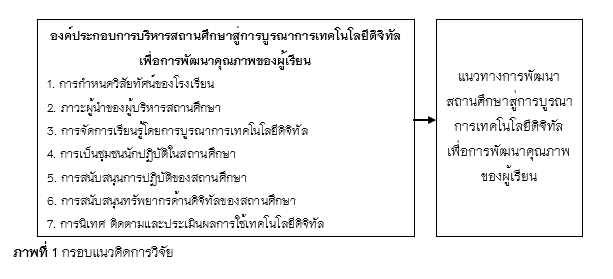Digital School Management: A Case Study of Successful Schools for Integrating Digital Technology to Develop the Quality of Learners
Main Article Content
Abstract
The objectives of this research were to study: 1) the conditions of school administration regarding the integration of digital technology for developing the quality of learners; and 2) guidelines for school administration in integrating digital technology to develop the quality of learners. The target group was five schools that have successfully integrated digital technology to develop the quality of learners. Key informants included administrators and teachers, totaling 15 individuals. The research employed a group discussion question and analyzed the data by content analysis. The research findings revealed the following: 1. conditions of school administration that are successful in integrating digital technology including: 1.1 defining a digital vision and communicating vision, 1.2 school administrators had leadership in digital technology and were good examples in integrating digital technology to develop the quality of learners, 1.3 teachers and personnel had the ability to use digital technology to integrate learning management, 1.4 school administrators, teachers, and personnel from all departments cooperated in exchanging knowledge and technological expertise, 1.5 schools provided support for learning management and school development by supporting an environment for learning, organizing student participation activities, and creating digital technology networks, 1.6 schools supported learning management with digital technology by providing training in knowledge and techniques regarding digital technology to teachers and personnel, and 1.7 schools provided a supervision system, monitored and evaluated the use of digital technology in management and learning management; and 2. guidelines for educational management to enable schools to integrate digital technology to develop the quality of learners were as follows: 2.1 schools set their visions through participatory process involving all stakeholders to create awareness and acceptance of common practices, 2.2 school administrators continuously learn and develop themselves to have the ability and skills to be technological leaders, 2.3 schools support and promote the use of digital technology in management and integration into the classroom, 2.4 schools encourage teachers and personnel in all departments to share knowledge and reflect on their work results within the community of practitioners, 2.5 schools create a collaborative network for learning management, integrating digital technology with network schools and external agencies to provide continuous development opportunities for teachers and learners, 2.6 schools create cooperation across all sectors to mobilize resources for training and the acquisition of new knowledge and skills in using digital technology for management and teaching, and 2.7 schools organize a supervisory system, monitor and evaluate the use of digital technology continuously to develop learner quality in line with the educational institution's policies and goals.
Downloads
Article Details

This work is licensed under a Creative Commons Attribution-NonCommercial-NoDerivatives 4.0 International License.
References
Awidi, I. T. & Paynter, M. (2022). An evaluation of the impact of digital technology innovations on students’ learning: Participatory research using a student-centered approach. Technology, Knowledge and Learning, 1-25. Retrieved from https://doi.org/10.1007/s10758-022-09619-5
Bates, A. W. (2015). Teaching in a digital age: Guidelines for designing, teaching, and learning. Victoria: BCcampus.
Cleveland, B., & Fisher, K. (2014). The evaluation of physical learning environments: A critical review of the literature. Learning Environments Research, 17(1), 1–28.
Flanagan, L., & Jacobsen, M. (2003). Technology leadership for the twenty-first century principal. Journal of Educational Administration, 41(2), 124-142.
Fournier, D. L. (2019). An exploration of technology leadership in three Maine public school districts. Electronic Theses and Dissertations. Retrieved from https://digitalcommons.library.umaine.edu/etd/2976
Gislason, N. (2010). Architectural design and the learning environment: A framework for school design research. Learning Environments Research, 13(2), 127–145.
Haleem, A., Javaid, M., Qadri, M.A. & Suman, R. (2022). Understanding the role of digital technologies in education: A review. Sustainable Operations and Computers, 3, 275-285.
Ilomäki, L. & Lakkala, M. (2018). Digital technology and practices for school improvement: Innovative digital school model. Research and Practice in Technology Enhanced Learning, 13(25), 1–32.
Katsenou, C., Flogaitis, E., & Liarakou, G. (2015). Action research to encourage pupils’ active participation in the sustainable school. Applied Environmental Education & Communication, 14(1), 14–22.
Ministry of Education. (2021). MOE digital transformation for education: Action plan 2020 – 2022. Bangkok: Office of the Permanent Secretary, Ministry of Education. [In Thai]
Office of the Education Council. (2017). National education plan 2017-2036. Bangkok: Prik Whan Graphic. [In Thai]
Office of the Education Council. (2019). Study report on the practice of creation and promotion of digital literacy for teachers. Bangkok: Prik Whan Graphic. [In Thai]
Ryan, M. K. & Haslam, S. A. (2007). The glass cliff: Exploring the dynamics surrounding the appointment of women to precarious leadership positions. Academy of Management Review, 32(2), 549-572.
Schmid, R., Pauli, C., & Petko, D. (2023). Examining the use of digital technology in schools with a school‑wide approach to personalized learning. Education Tech Research, 71, 367–390.
Somprach, K. (2006). Creating a shared vision of learning management. Quality Assurance Journal, Khon Kaen University, 7(1), 39-49. [In Thai]
Sotiriou, S. & Granic, A. (2021). A network for the enhancement of digital competency skills. Retrieved from https://www.researchgate.net/publication/297766405_A_network_for_the_enhancement_of_digital_competence_skills
Suksai, T., Suanpang, P., & Thangchitcharoenkhul, R. (2021). A digital leadership development model for school administrators in basic education to fulfill the Thailand 4.0 policy. PSAKU International Journal of Interdisciplinary Research, 10(2), 11-20.
Wikeley, F., Stoll, L., & Murillo, J. (2005). Evaluating effective school improvement: Case studies of programs in eight European countries and their contribution to the effective school improvement model. School Effectiveness and School Improvement, 16(4), 387–405.


